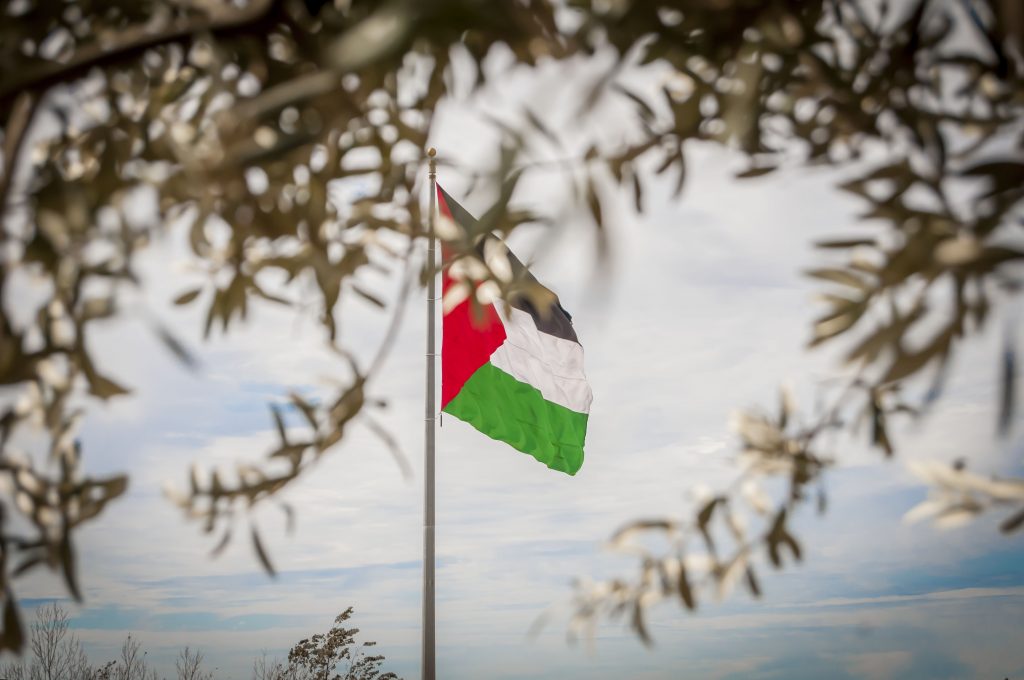
- ARAB NEWS
- 12 Jul 2025

The killing of Palestinian TV journalist Shireen Abu Akleh and the appalling Israeli police assault on her funeral appear to have temporarily shifted attention back to the issue of Palestine and the Israeli occupation.
Palestinian efforts to end the decades-long occupation in the context of a two-state solution appear to have international legal and popular support, but there has been no effective mechanism to implement it. Although the UN has been a major theater of operations for Palestinians to pursue their cause, it has so far failed to deliver.
However, a window of opportunity involving the UN may be available if the Palestinians agree to open it. The plan proposed in “The Olive Branch from Palestine,” a new book by the American philosopher and conflict-resolution specialist Prof. Jerome M. Segal, would activate a UN mechanism that has been in the deep freeze for decades.
Segal’s book calls for a UN General Assembly resolution endorsed by Palestine and submitted by respected member states (possibly Norway and Germany) reestablishing the UN Special Committee on Palestine. The original UNSCOP gave birth to the Partition Resolution of 1947, which became the basis for both the Israeli and the Palestinian declarations of independence. The new one, UNSCOP-2, would propose an end-of-conflict/end-of-claims plan based on the two-state solution, the right of the Palestinian people to self-determination, and maximum feasible respect for the rights of Palestinian refugees. Segal believes UNSCOP-2 would propose an independent Palestinian state with a shared Jerusalem, as envisioned by Bill Clinton’s parameters — and, most importantly, would recommend the new approach to the refugee issue that he has developed in his book.
Unlike the original UNSCOP, which the Palestinians boycotted in 1947, Segal expects UNSCOP-2 to be boycotted by the Israeli government. He views that as a good thing, since it would enable substantial Palestinian influence on its terms. Like its predecessor, however, UNSCOP-2, would not include any of the permanent members of the UN Security Council. It would report its proposals to the General Assembly, which would then call on Israel and Palestine to negotiate for three months to see if they could agree on any improvements to the peace plan, after which each country would put the plan to a referendum of its people. For the Palestinians, this would include all refugees, even those living outside Palestine. The UN would administer the Palestinian referendum.
Segal’s refugee idea, which he hopes UNSCOP-2 will consider, is based on John Kerry’s endorsement of the right of Palestinians to 100 percent of their land through land swaps. However, instead of land swaps with desert areas (as in the Trump/Kushner plan), Segal suggests the annexation to the Palestinian state of about50 villages that were abandoned in 1948, the right of Palestinian refugees from the remaining 350 villages to have a veto on what happens in those villages, and the possibility of a Nakba memorial in Palestinian villages that remain in Israel. His plan also calls for $400 billion in compensation to Palestinian refugees as part of an end-of-conflict settlement.
Segal’s refugee idea, which he hopes UNSCOP-2 will consider, is based on John Kerry’s endorsement of the right of Palestinians to 100 percent of their land through land swaps
Daoud Kuttab
Following the referendum, and hopefully with affirmations of respect for its results, the UN secretary-general would formally present the plan to the president of Israel as an offer of lasting peace from the Palestinian people to the Israeli people.
President Mahmoud Abbas told the UN in September 2021 that the Palestinians would change course if Israel did not withdraw from the Occupied Territories, but he gave no hint as to what the new direction would be.
The ideas presented by Segal represent what exists in the real diplomatic track to which Abbas is theoretically committed, but the president has done little to try to push the issue forward in innovative ways. No plan on its own will make much of a difference if not accompanied by a full strategy of liberation that must include genuine unity among Palestinians and a process that allows for new ideas and new personnel to implement them. Ideas alone will not move the dial unless there is a fully thought out, practical and doable plan that can get people excited.
Palestinians can’t be expected to live under occupation for ever while the rest of the world pays lip service to plans that they are not willing to support — but what the world will respond to are ideas that are serious,effective, and workable.
The sad conclusion is that the Palestinian leadership has run out of new and creative ideas. Segal’s plan maybe a good one, but what is needed today is not just innovative ideas. We need national unity, new blood, and a unified national strategy for liberation that the vast majority of Palestinians and friends of Palestine can support.
• Daoud Kuttab is an award-winning Palestinian journalist from Jerusalem. Twitter: @daoudkuttab